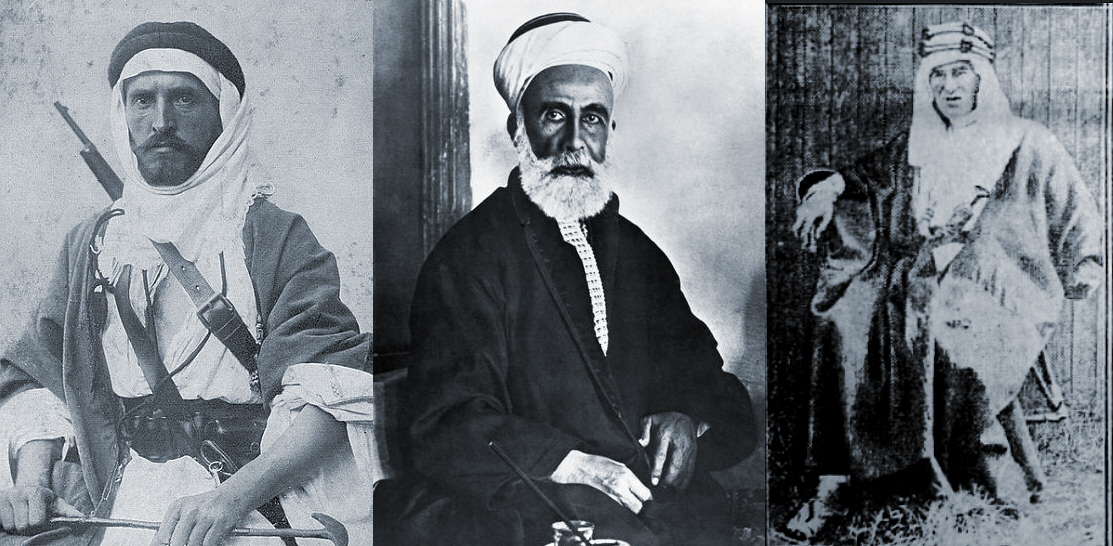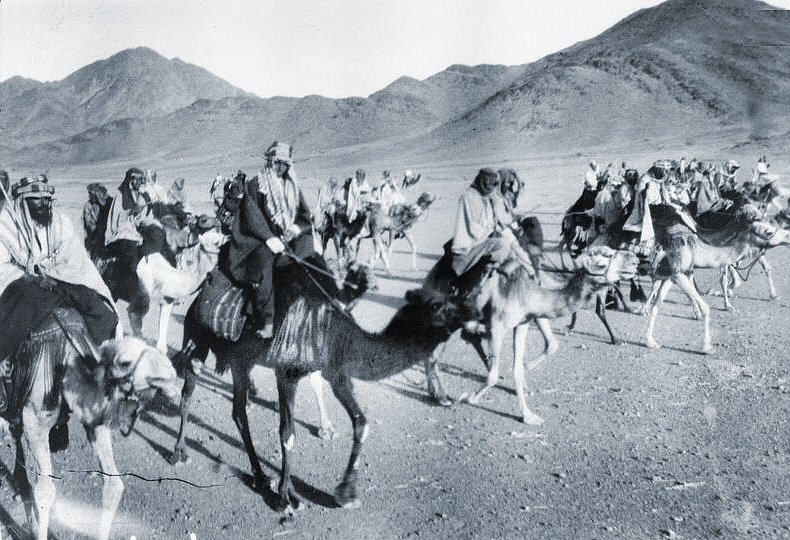THE ARAB REVOLT 1916–1918: SUCCESS or SUSPECT?
By Neil Dearberg
Click on Image to Expand
Key Actors in the Arab Revolt
Austrian Alois Musil, Sherif Hussein, T.E. Lawrence
Some people argue that the military consequences of the
Arab forces and the overall Arab Revolt (AR) were insignificant. This, however,
is to not fully appreciate the effect
of the AR. The consequences of that time have had a dramatic impact, albeit at
the time unexpected, on the world into the 21st century.
The Middle East today is a conglomeration of
contradictions: of family oil wealth, abject poverty, and absence of civic pride
in village life; a focus of nuclear possibilities, national economic distress
amidst refugee, and ethnic migrations; seething anti-western attitude, the home
of wonderfully hospitable hosts to visitors of any religion or nationality; the
cradle of monuments and treasures of the planets earliest civilized
inhabitants; a plethora of unrest and confrontation between the Islamic sects;
and the focus of world attention.
World War I and the nonsensical "peace" accords
immediately thereafter was the catalyst of today’s Middle East; a proper
understanding of the Arab Revolt and its role in this campaign is a small start
in understanding today’s Middle East.
Putting aside the military results, let’s look at other effects because winning sometimes
results from what you don’t get as much as what you do get!
Sheik Hussein, the Emir of Mecca, leader of local Muslims
and of great influence among many Muslims of the region, had the choice of
joining the Christian British or remaining linked to his fellow Muslims, the
Ottomans. Had he remained with the Ottomans, here are some likely effects:
- All Arab forces could have been against the British. This would have denied the British armed support, intelligence, local food supplies, potable water for men and animals, guides, and local knowledge,
- The Ottoman Sultan’s Jihad could have had a much greater effect as all Arabs may have joined, rather than have it dwindle as it did,
- The Muslims in the Indian/British Army may have deserted and taken up the Jihad call,
- Aqaba would not have been captured and that sea port denied as a supply route,
- General Allenby would have had an exposed right flank during the EEF’s advance through Palestine,
- The large Ottoman garrisons in Medina and Ma’an would have been available for redeployment against the British,
- The Egyptians may have risen against the British, not only denying a stable logistic base, but also creating a military/guerilla style conflict and jeopardizing the vital sea link of the Suez Canal.
- It would have denied the EEF the extremely valuable tens of thousands of workers in the labor and transport corps, without whom the campaign would have failed (the railway line across Sinai and following water pipeline would not have been built, nor the roads system, and the camel supply line would not have been available),
- Local tribes and villagers may have actively opposed and interdicted the British in Egypt, Sinai, Palestine, and the Arabian Peninsula.
The traditional Arab independent way of life ensures there is little cohesion between tribes and clans and the Arabian Peninsula was a hotbed of differences. Although Hussein did support the British, other Arabs favored the Ottomans. Others disfavored Hussein and the Hejaz Arabs without necessarily favoring the Ottomans. The Austrian archaeologist and Ottoman sympathizer/spy, Alois Musil, (there are no kangaroos in Austria!) was actively seeking the support of the northern (Syrian) Arabs for the Ottomans (just one reason Lawrence and Feisal were not fully successful in gaining Syrian Arab support).
Meanwhile, the Rashids of the northeastern Arabian
Peninsula had sided with the Ottomans and were engaged in hostilities with the
Sauds of the central Arabian Peninsula, who had indicated a preference for the
British but not Hussein. This effectively kept both these sizable forces out
of the main conflict — this may have changed in favor of the Ottomans had Sheik
Hussein endorsed the Jihad, bringing
both these groups into conflict with the British.
And of course, tribal Arabs simply wanted gold and didn’t
care whose it was – had their fellows taken Ottoman gold, it is likely more
could have done so.
Click on Image to Expand
Lawrence with Irregulars in the Desert (IWM Photo)
That Sheik Hussein convinced his sons and influential
Arabs to side with the British is a mystery. Arabs tend to favor a winner. At
the time of the commencement of the Arab Revolt, Gallipoli had been a disaster,
as had the British surrender at Kut in Mesopotamia and France was in stalemate,
going nowhere near any victory — so the British really had little with which to
impress anyone. For various reasons, perhaps Arab nationalism and his own
future glory as “King of the Arabs,” and of course his memory of incarceration
for fifteen years in Constantinople by the Sultan, Hussein sided with the British.
Muslim Indians and Egyptians throwing their weight against
the British would have seen a rapid loss of this campaign, leaving hundreds of
thousands of Ottoman troops available for service in France and the Western
Front. Then arguably, this too would have been lost quickly and the Germans
successful — perhaps this would have saved tens of thousands of lives in WWI
then, WW II avoided. Zionism may not have "got up," and Russia may not have
embraced Communism. But it didn’t happen that way, so we can think about it,
but never know.
The impact of mass desertions of Muslims from the Indian
Army should not be underestimated. Despite little detail of the Indian
contribution in official histories and popular historical novels, these forces
made up the bulk of the EEF so the
British could withdraw the infantry to France. Had this not
happened, France could well have been lost, as may the Suez Canal – and World
War I may have had a very different ending and you, dear reader, may have been
speaking Arabic or German today!
What is also little known, is that tens of thousands of
Egyptian "natives" were drafted into the
Egyptian Labor Force (ELF) and
the Camel Transport Corps (CTC). The
ELF built the railway from Suez to Haifa, the water pipeline that followed the
railway, roads through desert sands of Sinai and rocky plains of Palestine, and
the telegraph for communications. The CTC brought resupplies from railheads
and sea ports to the forward troops so they could maintain their advances. Had
the Egyptians not
supported as they did, the EEF would have gone nowhere and the British
campaign failed. Simply, it is impossible to conduct a successful campaign over
vast distances without strong logistics and local support.
Further, the local populations may well have actively
damaged or destroyed the vital water cisterns and wells and contaminated local
food sources. If an army does indeed travel on its belly, this would have been
disastrous. Ask Alexander the Great, Julius Caesar, and Napoleon, whose armies
had done this trip in earlier times.
So the Arab Revolt provided the British with several
beneficial effects:
- The Hejaz Arabs and their regular Northern and Southern Armies gave limited military support.
- Many Bedouin tribes, at times, sided with the Arab Revolt and the British, providing a mixture of consistent to inconsistent and unreliable military support, but at least they were not anti-British.
- Many Arabs stayed out of the conflict and so did not give support to the Ottomans or hinder the British.
- Those Arabs siding with the Ottomans were of little consequence to the British and Arab Revolt cause.
- General Allenby did not need to take valuable troops from his main force to deploy to his right flank and his logistics were secure
- The Muslims of the Indian Army and Egypt stayed loyal and gave immeasurable fighting and logistic support.
- The Suez Canal remained open and accessible.
- The campaign was won, convincingly, with General Allenby in command.
- Ottoman troops did not go to France in support of the German offensive.
- Despite the Sykes-Picot Agreement carving up Arab lands and denying Hussein his “King of the Arabs” title, of which Sheik Hussein and his sons were aware, the Arab Revolt continued to favor the British,
One can argue the military merits of the Arab Revolt. But had the coalition forces in Vietnam, Iraq, and Afghanistan achieved local support as the British did in this campaign (even with the lies, deceit, bribery, and betrayals), the ends of these latter campaigns may have been quite different, and a lot sooner.
© Neil Dearberg, 2010



How much gold did this cost the British? Was there really no better alternative use than giving it to unreliable, venal, murderous and not very militarily effective gangsters? Would not a disciplined force of regular Arab cavalry supplemented by air raids have done as much to protect Allenby's flank and keep dissident Arabs and aggressive but isolated Turkish forces at bay, and even to have raided the railroads?
ReplyDeleteHow much of the £220,000 per month was stolen by the leaders?